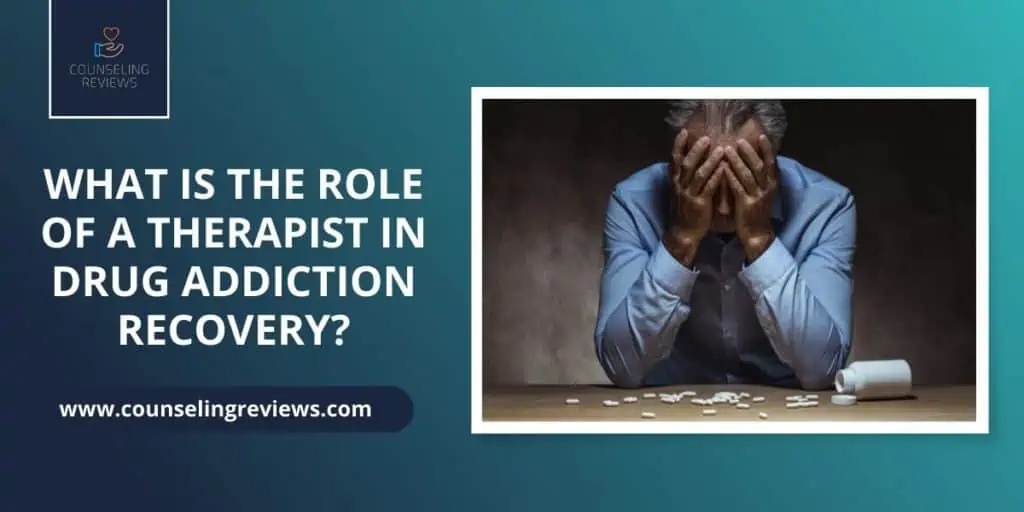As we all know that drug addiction recovery is a deep-rooted disease. Addicts of alcohol and drugs suffer from more mental disorders than just the effects of substance abuse. Most of their various behaviors related psychological issues result from a mental disorder or an event in the past.
This is why addicts need psychological help during the recovery process. They provide a critical support system for individuals recovering from drug and alcohol issues, gambling addiction, and other behavioral issues. By forming trustworthy relationships with patients, counselors provide resources, support, and judgment-free guidance that patients can utilize.
This guide will help you understand the role of a therapist in addiction therapy. So, let’s begin.

Create a Therapeutic Alliance with Patients
For an addict, the decision to seek treatment is not easy. It requires a great deal of trust between patient and their counselor. That is why counselors should create a robust bond with their patients, referred to as the therapeutic alliance.
This alliance is the trust patients feel with their counselors, which allows them to feel vulnerable checking out their problems and work together effectively. A robust therapeutic alliance ensures that patients view their counselor as trustworthy and know that their best interests are at the forefront.
Counselors can create a strong therapeutic alliance by:
Attentiveness during sessions
Ensuring patients that you’re interested in their well-being.
Letting patients know you will empathize with their problems.
Understanding the foundational issues at play in recovery.
A solid therapeutic alliance is a crucial factor in addiction treatment and recovery. It creates an environment where patients feel comfortable and welcome discussing their hardships.
Encourage Patient Recovery
Recovering from addiction is very difficult. Most often, people with alcohol or drug dependency fail to recognize their own patterns of abuse. This is where an addiction therapist plays a crucial role.
Therapist or counselor encourage their patients to stick with rehab and treatment. They constantly let them know about the benefits a sober lifestyle will bring their mental health.
Focus on a Patient’s Unique Experience
Every addict endures different withdrawal symptoms and emotions when going through recovery. In short, none of the recovering addicts are the same.
An essential part of an addiction therapist’s job is not to treat every addict the same. Instead intensive treatment, they have to assist their patients through their unique recovery journey. Therapists have to take every patient like a textbook study.
Building Trust
An addict goes through a lot during their journey of recovering. They endure one of the most challenging times of their lives. It is easy for an addict to have an emotional outburst and not want to comply with their treatment.
But why they behave this way? The main reason is they lack trust. The substances were their only companion for many years. So they don’t know what life is without their substance.
The role of a therapist is to help an addict build trust again. Because without trust, their patients won’t receive the help they need.
Provide Guidance for Loved Ones
Addiction recovery isn’t only about the addict. This process is also complex for the loved ones of the addict. They witness withdrawals, intense mood swings and watch their loved ones suffer. So, it’s also common for them to have questions about recovery and unsure of their roles.
An addiction therapist supports not only the addict in substance use disorder recovery but also their loved ones. They provide information on substance use disorders and abuse, the recovery process, and what loved ones can do to help their loved ones.
From the intervention to the instant when the addict is cleaned up from their addiction, an addiction therapist will be present in the whole process. Even after that, they provide more guidance on sober living.
Refer Patients to Support Groups
Therapy is not a former addict’s only option for psychological help. However, connecting with like-minded people helps them understand their addiction, reinforces that they aren’t alone in this journey.
But how does one go about finding support groups? First, the addiction therapist starts recommending support groups during initial sessions.
A good addiction therapist builds up a list of support groups for different substances. They even have support groups that can help former addicts engage in other activities, such as art or yoga.
Help Patients Develop a Relapse Prevention Plan
The chronic nature of addiction ensures that most of the diagnosed people will relapse at some point during recovery. Some studies revealed that 40-60 percent of addicts would relapse at some point during their life, which is on par with other well-understood diseases such as asthma, diabetes, and hypertension.
But that doesn’t mean that drug addiction treatment alone has failed; rather, it serves as an indicator that treatment plans need to be adjusted to best help the patient.
Once an addict decided to seek treatment, they must be well equipped to avoid relapse in the future. It requires quite just the willpower to mention “no” when temptation arises, and prevention must start early within the recovery process. Therefore, a comprehensive relapse plan is an essential part of ongoing treatment and the therapist’s role in addiction recovery.
Therapists made plans according to the needs of each patient, but essential elements include:
A detailed profile of the patient’s experience with drug abuse, including previous relapses.
Complete a list of family members, friends, and counselors that can further be used as a support network.
All the warning signs and ways patients can best manage them.
Emergency relapse plan.
Particular lifestyle changes that patients can do to prioritize their well-being
Crisis Intervention
Even with the best drug treatment, facilities and plans, drug and alcohol recovery are not an easy process. Every patient will mainly experience acute physical and emotional distress at some point, including recovery issues and drug relapse.
To provide proper treatment, counselors must recognize the specific crisis and examine the particular elements of the situation, both mental health conditions and especially physical distress.
The therapist set an immediate course of action for behavior therapy, depending on the cases. Effective therapists need to take fast action to prevent the situation from worsening.
5 tips for supporting loved ones who are recovering from addiction
Supporting someone who is on the path to recovery from addiction is a delicate and often challenging endeavor. It requires patience, empathy, understanding, and a commitment to their well-being. While your intentions may be pure, it’s crucial to approach this process with a well-informed and thoughtful approach. Here are five tips to help you navigate this journey effectively.
Prioritize Self-Care: A Foundation for Effective Support
Supporting a loved one in recovery can be emotionally and mentally taxing. It’s essential to remember that you can’t pour from an empty cup. Just as your loved one needs to focus on their well-being, you must prioritize your self-care as well. Engage in activities that bring you joy and relaxation.
Seek emotional support from friends, family, or even therapy. By taking care of yourself, you’ll be better equipped to provide the support your loved one needs.
Understanding Addiction as a Disease: Empathy is Key
Addiction is a complex disease that affects both the brain and behavior. It’s important to view your loved one’s struggles through a lens of empathy, recognizing that they are grappling with a medical condition rather than a moral failing.
This perspective shift can help reduce stigma around mental illness and foster understanding, enabling you to offer genuine support without judgment.
Education is Empowerment: Learning About Substance Use Disorder
Educating yourself about addiction and substance use disorder is a powerful way to offer meaningful support. Understand the science behind addiction, the potential triggers, and the recovery process. Familiarize yourself with available treatment options, therapy approaches, and relapse prevention strategies.
This knowledge will enable you to engage in informed conversations, provide relevant resources, and be an active participant in their recovery journey.
Balancing Love and Boundaries: Providing Comfort without Enabling
Your love and comfort are invaluable to your loved one’s recovery, but it’s crucial to strike a balance between being supportive and inadvertently enabling their addiction.
Avoid behaviors that might inadvertently perpetuate their harmful habits. This can be challenging, as it may involve setting boundaries, saying no when necessary, and holding them accountable for their actions. Remember that your actions should align with their well-being in the long term, even if it means short-term discomfort.
Providing Support without Enabling: Navigating a Fine Line
Walking the tightrope between offering genuine support and enabling addictive or risky behaviors can be challenging. Enabling can manifest in various forms, such as covering up mistakes, providing financial assistance without conditions, or avoiding discussions about their struggles.
Focus on actions that empower their recovery rather than hinder it. Offer emotional support, accompany them to therapy sessions, and encourage healthy habits. Your role is to be a pillar of strength as they navigate the challenges of recovery.
The 5 Stages of Addiction Recovery
1. Precontemplation Stage: Recognizing the Need for Change
The contemplation stage marks the initial phase of addiction recovery. At this stage, individuals may not be fully aware of the extent of their addiction or the negative impact it has on their lives.
Denial and resistance to change are common characteristics of this stage, as people may downplay the severity of their addiction or believe that they can control it on their own. Family members and friends often play a vital role in encouraging individuals to recognize the need for change.
2. Contemplation Stage: Weighing the Pros and Cons
As individuals progress to the contemplation stage, they begin to acknowledge the negative consequences of their addiction and consider the possibility of change. This stage is marked by ambivalence—individuals may recognize the benefits of sobriety but also feel hesitant about giving up their addictive behaviors.
Exploring the pros and cons of continued substance use versus recovery becomes a focal point during this phase. Supportive interventions, such as therapy and counseling, can help individuals navigate their conflicting feelings and move towards a decision.
3. Preparation Stage: Getting Ready for Change
In the preparation stage, individuals have made the decision to pursue addiction recovery and are actively preparing to take action. This stage involves setting goals, developing strategies, and seeking out resources that will aid in the recovery process.
Creating a solid support network, including therapists, support groups, and mentors, is crucial during this time. Additionally, individuals may begin to eliminate triggers and situations that contribute to their addictive behaviors, further solidifying their commitment to change.
4. Action Stage: Taking Definitive Steps
The action stage marks a significant turning point in the recovery journey. It involves putting plans into motion and taking concrete steps to achieve sobriety.
This stage is often characterized by noticeable changes in behavior, lifestyle, and daily routines. Individuals may participate in formal treatment programs, engage in therapy sessions, and adopt healthier habits to replace their addictive behaviors. The action stage requires resilience, determination, and a willingness to face challenges head-on.
It’s important to celebrate even small victories during this stage, as they contribute to building a sense of accomplishment and self-efficacy.
5. Maintenance Stage: Sustaining Progress and Preventing Relapse
The maintenance stage is focused on sustaining the progress achieved during the action stage and preventing relapse. This stage is about building upon the foundations of recovery, reinforcing healthy habits, and developing coping strategies to navigate triggers and temptations.
While the risk of relapse never fully disappears, individuals in the maintenance stage are better equipped to handle potential setbacks. Continued engagement in therapy, participation in support groups, and ongoing self-care practices are essential components of maintaining sobriety in the long term.
Summary
Therapists are an essential part of every treatment facility. The functions mentioned above are difficult to master, but they must be considered for every patient. And when all these goals are met, patients will be able to recover and regain their lives.





